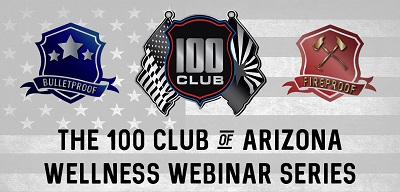PTSD, Anxiety, and Depression Webinar Series for First Responders
Date:Tuesday February 2, 2021

First responders never know exactly what to expect from a given day on the job. These everyday heroes face mental and physical challenges and tremendous pressure to protect and serve the public. Unfortunately, they also deal with higher than average levels of trauma. This can cause first responders to struggle with post-traumatic stress disorder, depression, and anxiety—to name a few. In fact, a recent study found that PTSD and depression can be almost five times as high among firefighters and police officers than the general public.
Work is being done to provide these brave individuals the help they need so they can not only survive, but thrive in their jobs, communities, and personal lives. The 100 Club of Arizona has a stellar webinar series that enables first responders and their families to tune in from any online device and listen to talks about first responder wellness from leaders in the field. We’ve rounded up some of their most popular past discussions, as well as links to two upcoming live webinars you can attend for free, via the Zoom platform.
Upcoming Webinar: Suicide Explained
This webinar will provide an in-depth explanation of how an individual can begin to contemplate suicide as an option, what it takes to follow through with suicidal ideation, and how prevention and treatment can help someone with the elements that cause thoughts of suicide. This webinar will also cover the signs of someone who may be suicidal, or in crisis, as well as how to perform an intervention, in order to help someone save their own life.
Upcoming Webinar: Managing Fear, Anxiety & Panic Responses
- Date:
- March 11, 2021
- Time:
-
10:00 am – 11:30 am
- REGISTER:
- https://zoom.us/webinar/register/2216100517516/WN_bK-TRbNBQGSCDh5wGvXS2g
In only a few seconds, a threat can change a First Responder’s life… because that threat can affect the responder’s reactions and abilities in many ways. This training course will teach the different physiological effects of being in a threatening situation, and will demonstrate how to calm anxiety, and prevent panic, for calm and stable handling of intense situations.
Recorded Webinar: First Responder Stress, Trauma & Coping
Being a first responder is an inherently stressful job. Add on trauma, a global pandemic, and community unrest, and even more issues arise. This webinar will help responders understand the stress cycle, resiliency, and trauma. Participants will learn skills to better manage stress specific to their occupation, and how to mitigate the effects of trauma. Focus will also be given to managing stress and trauma during Covid-19 and riots.
Recorded Webinar: First Responder Anxiety, Depression & Loneliness
Dr. Kathy Thomas “Kat” and Brad Shepherd will have a very practical discussion on the enormous and complex topics of anxiety, depression, loss and loneliness. We know that our thoughts and our feelings may run away from us from time to time. Especially if we are not practicing good, sound, consistent self-care practices. These do not define us and they are rarely true. Research has shown 80% of our thoughts contain negative messages and when we are depressed. Trying to control thoughts and feelings will lead to more anxiety and depression rather than bringing us to a happy place. Kat & Brad will visit about what these topics looks like along with the ever difficult and dangerous feelings of loss & loneliness that can be tremendously difficult to navigate without assistance. Join us as we focus on conversations about difficult topics.
Compassion Fatigue For First Responders – Living Your Life in the Green
Compassion Fatigue is a state characterized by a gradual lessening of compassion over time. It is common among individuals that work directly with trauma survivors such as firefighters, police officers, emergency medical services, emergency room nurses, doctors, crisis workers, dispatchers, psychologists, and other first responders. However, sufferers can exhibit several symptoms including hopelessness, a decrease in experiences of pleasure, depression, constant stress and anxiety, sleeplessness or nightmares, and a pervasive negative attitude. We find in the behavioral health arena it has a significant presence and can lead to negative outcomes for these helpers and can have an impact on patient care, relationships, and can lead to health issues. Living your life in the green is all about learning how to take care of yourself and identify those issues that trigger you to act in a negative manner. This is where the real work begins.
